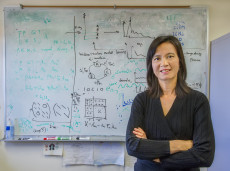CRD’s Sherry Li Takes on New Role at Exascale Computing Project
February 24, 2020
The U.S. Department of Energy's Exascale Computing Project (ECP) has named Sherry Li, a senior scientist in Berkeley Lab’s Computational Research Division, as team lead for the ECP’s Mathematical Libraries division.
Li replaces Lois Curfman McInnes, a senior computational scientist at Argonne National Laboratory, who is now Deputy Director for Software Technology at ECP. McInnes’ new position was formerly held by Jonathan Carter, who was recently named Associate Lab Director of the Berkeley Lab Computing Sciences Area and now represents the Lab on the ECP Laboratory Operations Task Force.
“Sherry is an internationally recognized mathematician and computer scientist who is well-known and respected in the math software community,” said Lori Diachin, ECP Deputy Director, in a news release announcing the management changes.
“We are fortunate to have such an incredibly seasoned, knowledgeable, and respected staff to help us lead the ECP efforts in bringing the nation’s first exascale computing software environment to fruition,” added Mike Heroux, director of ECP Software Technology.
Over the last two decades, Li has been instrumental in the development and adoption of multiple mathematical libraries for high performance computing applications - notably SuperLU, a widely used solver library she originally started working on during her PhD that has been in use internationally for 20 years. She is also principal investigator for the ECP’s STRUMPACK/SuperLU/FFTX subproject.
In recent years, those involved in the ECP Math Libraries have been focused on making the libraries suitable for exascale machines, with a particular emphasis on programming and porting the codes to GPUs, Li noted. “There are currently six ECP projects in the Math Libraries section, and as the supercomputers become increasingly powerful , we are having to redesign the algorithms to make them more scalable,” she said.
The software developers have also been working on new functionalities in response to emerging applications such as machine learning and deep learning.
“So on the one side we are improving the existing capabilities of these libraries for the bigger machines, while on the other side we are developing new mathematical algorithms,” Li said. “My role will now be to ensure that all these projects reach their milestones and satisfy the needs of the high-level application codes.”
About Berkeley Lab
Founded in 1931 on the belief that the biggest scientific challenges are best addressed by teams, Lawrence Berkeley National Laboratory and its scientists have been recognized with 16 Nobel Prizes. Today, Berkeley Lab researchers develop sustainable energy and environmental solutions, create useful new materials, advance the frontiers of computing, and probe the mysteries of life, matter, and the universe. Scientists from around the world rely on the Lab’s facilities for their own discovery science. Berkeley Lab is a multiprogram national laboratory, managed by the University of California for the U.S. Department of Energy’s Office of Science.
DOE’s Office of Science is the single largest supporter of basic research in the physical sciences in the United States, and is working to address some of the most pressing challenges of our time. For more information, please visit energy.gov/science.










